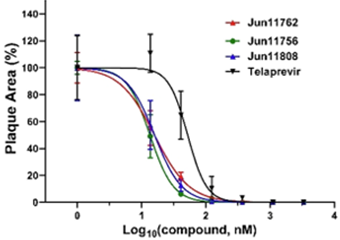
Published data for lead compounds, the telaprevir-derived 2Apro inhibitor Jun11762 and others, demonstrate substantial improvement over Telaprevir in plaque assay. See link to paper below. 
Invention Summary:
The genus Enterovirus of Picornaviridae contains many significant pathogens related to human and mammalian diseases. Enterovirus D68 (EV-D68) infection is linked to the neurological disorder acute flaccid myelitis (AFM), where both infections and incidence of AFM have been consistently increasing for the past decade. Recent efforts in EV disease research have identified compounds with limited efficacy in the inhibition of EV-D68. However, additional and specific antivirals are needed to combat EV-D68, as these inhibitors demonstrate a lack of potency and selectivity, as well as pharmacokinetic property liabilities, which impedes development into clinical candidates.
Researchers at Rutgers have designed and tested telaprevir-derived inhibitors that target the 2A protease (2Apro) of EV-D68 and demonstrate high potency. Supported by in vitro and in vivo PK and toxicity data, published results demonstrate effective inhibition and high tolerance in treated mice.
Market Applications:
Advantages:
Publications:
• J. Med. Chem. 2023, 66, 21, 14544–14563
Intellectual Property & Development Status: Non-Provisional application filed. Patent pending. Available for licensing and/or research collaboration. For any business development and other collaborative partnerships, contact: marketingbd@research.rutgers.edu